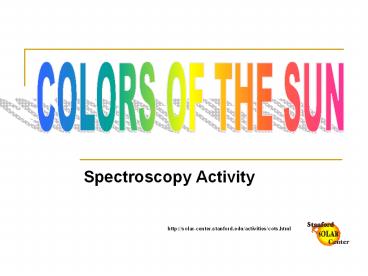Spectroscopy Activity - PowerPoint PPT Presentation
Title:
Spectroscopy Activity
Description:
Spectroscopy Activity. http://solar-center.stanford.edu/activities/cots.html. COLORS OF THE SUN ... Solar. Hydrogen. Helium. Sodium. Calcium. Mercury. Neon ... – PowerPoint PPT presentation
Number of Views:23
Avg rating:3.0/5.0
Title: Spectroscopy Activity
1
COLORS OF THE SUN
- Spectroscopy Activity
- http//solar-center.stanford.edu/activities/cots.h
tml
2
What is Spectroscopy?
3
Build a Spectroscope
4
1. Cut out pieces fold
- Cut along all of the red lines to separate the
pieces of the spectroscope. You should now have 8
pieces - Spectroscope body
- Gap Edge
- Spacers(2)
- Diffraction Grating
- Eyepiece
- Numbered Scale
- Scale Cover
- Write your name on the colored side of the
spectroscope body where it say This spectroscope
belongs to
5
2. Assemble Spectroscope Body
- With the black side up, use a straight edge to
crease the spectroscope body along each of the
grey dashed lines. Then fold the spectroscope
body closed (with black side in). Put flap B over
flap A so they overlap and tape edge as shown
6
3. Form wide scale side of Spectroscope
- On the wide, open side there are two long flaps
labeled flap C and flap D. Fold down flap D then
fold down flap C over it. Tape flap C as shown.
Then fold down the small end tab and tape corners
as shown.
7
4. Finish end of spectroscope
- Fold down the end tabs, then fold Flap C down
over the end tabs as shown. Tape the corners of
the end as shown.
8
5. Make entrance slit
- Light must enter the spectroscope through a gap
formed between flap C and the gap edge. The gap
is called the entrance slit. READ CAREFULLY it
is important for the gap to be straight and
narrow, so you will need to use the spacers.
Stack both spacers and sandwich them between flap
C and the gap edge as shown. Hold the gap edge
tight against the spacers and tape on the
spectroscope. Then remove the spacers from the
gap. You should be able to see through the slit
and it should be two thicknesses of the poster
paper. Note the slit will be a little
off-center but this is O.K.
9
6. Align attach grating and eyepiece
- At the narrow end of the spectroscope, fold the
end tabs to form a square opening and tape as
shown. Next, cover the square opening with the
diffraction grating. Before taping, make sure
your diffraction grating is aligned so that the
word Warning is facing out and cover the
Warning on the bottom end tab. Tape the
correctly aligned grating securely in place.
Tape the eyepiece over the grating with the
Warning aligned.
10
7. Position scale
- Place the numbered scale so it covers the open
side of the spectroscope. When viewed through
the eyepiece, the 3000 end should be closest to
the slit. DO NOT TAPE UNTIL STEP 8. Holding the
scale in place while looking through the
eyepiece, aim the spectroscope so you can see a
fluorescent light through the slit. (It must be a
fluorescent light, an incandescent light bulb
will not work) You will se colored lines on the
scale these are spectral lines. If the
spectral lines appear above the slit instead of
over the scale, rotate the diffraction grating ¼
turn.
11
8. Calibrate spectroscope
- Slide scale back and forth until dashed line at
5450Å is aligned with green spectral line from
fluorescent lamp. The tape scale in place.
Finally place scale cover over the scale and tape
it only along the top edge. That way you can
lift the scale cover if it is too dark to read
the scale.
12
Congratulations!
- Your spectroscope is fully operational. Look at
various sources of light with your spectroscope.
NEVER LOOK DIRECTLY AT THE SUN. (and if you do,
dont do it with your remaining eye)
13
Activities
- Look at various sources of light and draw the
spectrum that you see on the provided worksheet. - Some suggestions are
- Fluorescent lamps
- Light bulbs
- TVs or computers
- A white object in sunlight
- A colored object in sunlight
- The Moon
14
Appendix A Sample Spectra
- Solar
- Hydrogen
- Helium
- Sodium
- Calcium
- Mercury
- Neon
- Argon
- Water
15
Appendix B How does it work?
16
Appendix C What is diffraction?































